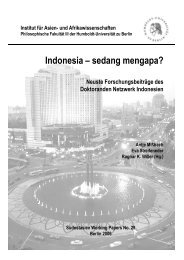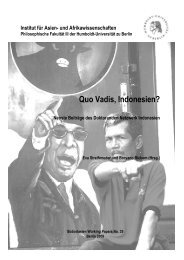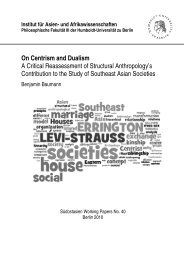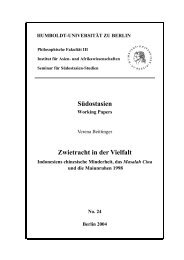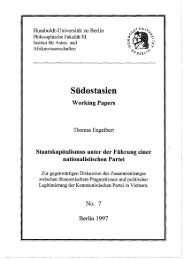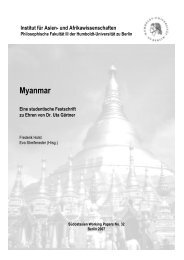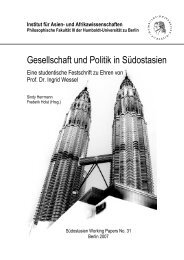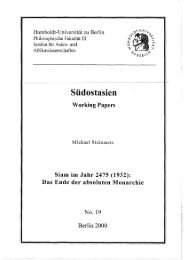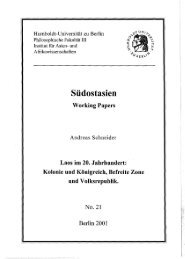Connecting the Philippines and Germany - HU Berlin
Connecting the Philippines and Germany - HU Berlin
Connecting the Philippines and Germany - HU Berlin
Create successful ePaper yourself
Turn your PDF publications into a flip-book with our unique Google optimized e-Paper software.
Hindsight <strong>and</strong> anti-clericalism are fatal defects in a purely scholarly work but, as mentioned earlier,<br />
Rizal used history as a propag<strong>and</strong>a weapon against <strong>the</strong> abuses of <strong>the</strong> colonial Spaniards. Rizal’s Morga<br />
should be seen <strong>and</strong> excused in this context. The problem with Rizal is his constant ambiguity: Is he<br />
trying to be a scholar or a propag<strong>and</strong>ist? Hence <strong>the</strong> Morga was deemed too historical, too scholarly for<br />
propag<strong>and</strong>ists, while historians <strong>and</strong> scholars found <strong>the</strong> work too biased, too much a work of propag<strong>and</strong>a<br />
to be taken seriously.<br />
While Blumentritt’s critique was undeniably tempered by his friendship for Rizal, one must remember<br />
that Rizal solicited <strong>the</strong> introduction. What finally saw print was a version approved <strong>and</strong> slightly edited<br />
by Rizal. Unfortunately, this draft introduction is not extant, but we can extrapolate from <strong>the</strong> Rizal-<br />
Blumentritt correspondence to see what Rizal found objectionable, what he wanted deleted from <strong>the</strong><br />
introduction.<br />
Writing from Paris on November 19, 1889, Rizal thanked Blumentritt for writing <strong>the</strong> introduction to<br />
his edition of Morga. He liked it very much, <strong>and</strong> praised it for being written “both with head <strong>and</strong><br />
heart.” Be that as it may, Rizal reacted strongly against Blu<br />
“La gran estimación de tus notas no me impide confesar que más de una vez he observado que partcipas<br />
del error de muchos historiadores modernos, que censuran los hechos de siglos pasados según<br />
conceptos que corresponden á las ideas contemporáneas. Esto no debe ser. El historiador debe no imputar<br />
á los hombres del siglo XVI el ancho horizonte de las ideas que conmueven al siglo XIX. Lo<br />
segundo con que no estoy conforme, son algunos desahogos contra el catolicismo; creo que no en la<br />
religión, sino en el proceder duro y en los abusos de mucho sacerdotes deben buscarse el origen de<br />
muchos sucesos lamentables para la religión, para España y para el buen nombre de la raza europea.mentritt’s<br />
mention of “Quiopquiap” (pseudonym of Pablo Feced, bro<strong>the</strong>r of ex-governor Jose Feced<br />
y Temprado, a prolific journalist who wrote racist, anti-indio articles). Rizal told Blumentritt that<br />
Quiopquiap may be highly regarded in Spanish circles in Manila, but he was not worthy of attention.<br />
Rizal declared that he did not want “to soil <strong>the</strong> pages of my book” with this name. “I do not write for<br />
<strong>the</strong> Spaniards in Manila, I write for my countrymen <strong>and</strong> we all detest Quiopquiap.” 50<br />
Three days later, on November 22, 1889, Rizal returned <strong>the</strong> draft of Blumentritt’s introduction toge<strong>the</strong>r<br />
with his “corrections.” Even if Blumentritt had earlier authorized Rizal to edit it however he<br />
wished, out of courtesy Rizal sought Blumentritt’s final approval. Apart from <strong>the</strong> deletion of <strong>the</strong> name<br />
Quiopquiap, Rizal cut out <strong>the</strong> text relating to fraternidad (fraternity) between indios <strong>and</strong> Spaniards.<br />
Rizal told Blumentritt that, despite his good intentions, his notion of fraternal love between Spaniards<br />
<strong>and</strong> indios was liable to give <strong>the</strong> wrong impression.<br />
“You wish <strong>the</strong> Spaniards to embrace us as bro<strong>the</strong>rs, but we do not ask for this by always imploring <strong>and</strong><br />
repeating this because <strong>the</strong> result is humiliating for us. If <strong>the</strong> Spaniards do not want us as bro<strong>the</strong>rs, nei<strong>the</strong>r<br />
are we eager for <strong>the</strong>ir affection. We will not ask for fraternal love as if it were like alms. I am<br />
Spain; but we do not solicit <strong>the</strong> compassion of Spain, we do not want compassion, but justice... Fraternity<br />
like alms from <strong>the</strong> proud Spaniard we do not seek. I repeat, you only have <strong>the</strong> best intentions, you<br />
want to see <strong>the</strong> whole world embraced by means of love <strong>and</strong> reason but I doubt if <strong>the</strong> Spaniards wish<br />
<strong>the</strong> same.” 51<br />
Despite his intense feelings, Rizal’s tone remains very cordial with Blumentritt. It must be stressed<br />
here that Rizal did not take criticism well, especially if it came from racist Spaniards like Quiopquiap<br />
or Vicente Barrantes, whom Rizal answered in <strong>the</strong>ir propag<strong>and</strong>a paper La Solidaridad. Indeed, he was<br />
surprisingly hostile to a fellow patriot in “A Reply to Mr. Isabelo de los Reyes,” which saw print in La<br />
Solidaridad in 1891. In this arcticle we see all <strong>the</strong> more clearly <strong>the</strong> real motives of Rizal’s scholarship.<br />
Isabelo de los Reyes (1864-1938) was a journalist, businessman, labor leader, politician <strong>and</strong> prominent<br />
member of <strong>the</strong> schismatic Iglesia Filipina Independiente (Philippine Independent Church) which<br />
50 Ep. Riz V p.510.<br />
51 Op cit. V, pp.516-517.<br />
19



